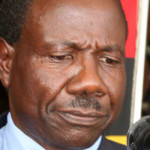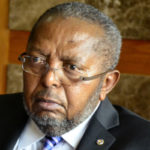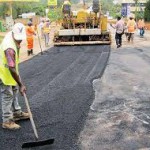
The roads sector has for the fourth year running topped the priority areas of government spending which will amount to Shs 23,972 billion in the next financial year, half of which will go to ministries, Departments and Government Agencies.
Reading the budgetary estimates for the year 2015/16 under the theme ‘Maintaining Infrastructure Investment and Promoting Excellence in Public Service Delivery’, finance Minister Matia Kasaijja said roads had been apportioned 3.328.79 billion, representing a budgetary allocation of 18.2 per cent, for construction and rehabilitation.
The Minister enumerated eight highways that had been completed and these include Tororo – Mbale – Soroti and Jinja – Kamuli in Eastern Uganda, Hoima – Kaiso – Tonya and Buteraniro – Ntungamo in Western Uganda, Kampala – Masaka and Namanve Industrial Park Access Road in Central Uganda; and Vurra- Arua- Koboko – Oraba and Gulu- Atiak in Northern Uganda.
The Minister further listed 22 roads currently under construction, and disclosed that over the last five years, paved roads in the country had increased by 889 kilometres, while the kilometer coverage of reconstructed paved roads stood at 882.
He also said that out of the annual target of 250 km, a total of 167 kilometres of roads had been upgraded from gravel to tarmac, and announced the creation of a Road Reserve Protection Unit comprised of officers from the Uganda National Roads Authority (UNRA) and the police.
Following the Public Finance Management Act 2015, this is the first time the budget has been approved by Parliament before the financial year begins, and Kasaijja said this move will enhance financial discipline, ensure accountability and enhance reporting for public resources.
He announced that the Ugandan economy is currently valued at 75.183 trillion, about 25 billion dollars, 17 per cent bigger than it was previously estimated, and that the economy was expected to grow by 5.3% in the financial year 2015/16.
“The budget seeks to attain a better future for Uganda and is anchored on the Second National Development Plan (NDPII), launched earlier today. Allocations have been made to fund strategic choices that will drive the socio-economic transformation of the country into a middle income country” the 53-page budget release indicates in part.
Kasaijja, who was made finance minister in this year, also has good news for the men and women in uniform and other security agencies, apportioning a defence budget of over one trillion shillings (shs1.632.89bn) to cater for recruitment and training; acquisition of modern equipment; peacekeeping, defence diplomacy and conflict resolution; and improvement of welfare including accommodation, medical facilities and access to credit.
In order to achieve the fiscal goals, Kasaijja also announced that domestic revenues are expected to increase to Shs. 11,333 billion up from Shs. 9,799 billion, through interventions like increased passport fees and levies.
According to the Minister, passport fees have increased from 120.000 to Shs150.000, and increase of Shs30.000, while any person who wants to get a passport within 24 hours will part with Shs300.000.
Similarly, in respect to increasing the tax base, Mr Kasaijja announced a temporary increase of the ‘environmental levy’ on used motor vehicles from 20 to 35 per cent for vehicles of between 5-10 years (as at date of manufacture), while those vehicles above 10 years will attract a levy of 50 per cent. This levy excludes commercial vehicles.
On energy the minister said that electricity production had risen from 595MW in to 851MW in 2014, and that the government would address the pitfalls including high costs and unreliable power (outages), to enhance production.
For details see full text below.







